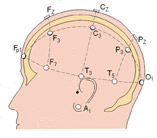More About EEG
EEGs at Optimal-Neurofeedback
Recording
The EEG recording technologists at Optimal-Neurofeedback record exceptionally high quality EEGs at their facilities or at individual health care professionals' offices. The recordings are then either provided directly to a Neurologist or transmitted to external facilities for further processing, advanced mathematical analysis, and comparison to a database of normative recordings.
Analysis
The EEG Analysist at the external facility reviews all data, assembles the findings, and provides a focused report to the original requestor.
EEG Services - Main Page
Electroencephalography
 A neuron, or nerve cell is an electrically excitable cell that processes and transmits information by electrical and chemical signaling. Electroencephalography (EEG) is the recording of electrical activity along the scalp produced by the firing of neurons within the brain. In clinical contexts, EEG refers to the recording of the brain's spontaneous electrical activity over a short period of time, usually 20–40 minutes, as recorded from multiple sites on the scalp. The EEG "electrode" is a sensor that does not send anything into the brain, but conducts a measure of the extremely small neural signaling voltages to specialized amplifiers.
A neuron, or nerve cell is an electrically excitable cell that processes and transmits information by electrical and chemical signaling. Electroencephalography (EEG) is the recording of electrical activity along the scalp produced by the firing of neurons within the brain. In clinical contexts, EEG refers to the recording of the brain's spontaneous electrical activity over a short period of time, usually 20–40 minutes, as recorded from multiple sites on the scalp. The EEG "electrode" is a sensor that does not send anything into the brain, but conducts a measure of the extremely small neural signaling voltages to specialized amplifiers.
qEEG

Quantitative EEG assists the physician and psychologist to identify underlying anomalies in the EEG that can be associated with the patient's functional or behaviorial problems. The comparison to a normative database can reveal:
- Cortical Hypofunction and Hyperfunctions
- Cortical Disconnections and Hyperconnections
- Postconcussive sequelae
rEEG

Referenced-EEG (rEEG®) is the first objective, physiology-based system consistently shown to guide psychiatrists to appropriate treatment for the most challenging patients. The patented process to reduce "trial and error" results in:
- Patient benefits
- Physician benefits
- Payer benefits
Clinical EEG

A Clinical EEG is usually provided directly to the ordering Neurologist for their examination. Recordings may be for:
- Seizure disorders
- Movement disorders
- Fainting, migranes, or other dysfunction
